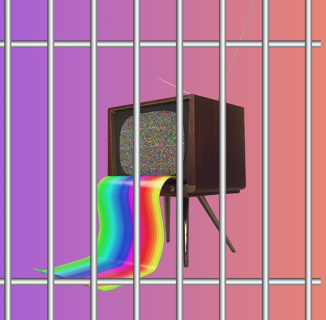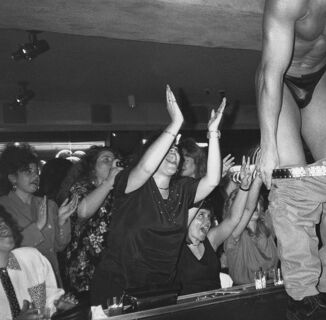Facebook has been under fire this week for two revelations impacting the LGBTQ community: past donations to Republican political candidates that support conversion therapy, and a broad new policy that appears to ban users from discussing “sexual preference,” roles, and making “sexually suggestive” statements.
Facebook’s community standards regarding “sexual solicitation” have been drawing criticism this week from LGBTQ users of the platform as well as from sex workers — both groups that are likely to be the most impacted by the guidelines.
According to its community standards, Facebook bans content which uses “sexual hints such as mentioning sexual roles, sex positions, fetish scenarios, sexual preference/sexual partner preference, state of arousal, act of sexual intercourse or activity (sexual penetration or self-pleasuring), commonly sexualized areas of the body such as the breasts, groin, or buttocks, state of hygiene of genitalia or buttocks.” The sweeping language caused an uptick in panic as people began to slowly discover the new policy that dates back to October 15.
Facebook’s updated community standards are fucking WILD! Stating your sexual orientation is now literally against the rules and is seen as solicitation.
Also butts are not ok anymore either.Fuck this so much. Everything about it. pic.twitter.com/VMN1Drq9mN
— Jennifer Scheurle (@Gaohmee) December 5, 2018
Hold up, "mentioning your preferences in sexual partners" is banned now?
What happened to the Facebook that gave us Pride flag reacts and rainbow backgrounds?
— The Keeper of the Shine (@valcedony) December 5, 2018
The reference to “sexual partner preference” has caused immense confusion, with many people noting that Facebook gives users the option to identify their sexual orientation, gender identity, and preferred sexual partners in their profile settings. The move also raised questions about why a company that has traditionally made overtures to the LGBTQ community in the form of Pride month filters, partnerships with groups like Trevor Project, and a perfect score on HRC’s Corporate Equality Index would create a policy that appears to ban users from saying something as simple as “I’m a woman who has sex with other women.”
For queer people, it’s not entirely possible to separate frank discussions of sexuality and partners from issues of politics and equality. When your “sexual partner preference” is the very thing that prevents you from accessing full social and political equality, it’s direly important to be able to discuss it — and difficult to come out of the closet without referencing it in some way. For trans people, not being able to discuss breasts, genitalia, or other “commonly sexualized areas” means in some ways not being able to discuss transitioning, surgery, feelings of dysphoria, or access to appropriate healthcare.
LGBTQ youth are especially dependent on social media when it comes to learning about and discussing sexuality, said Lincoln Mondy, a spokesperson for the organization Advocates for Youth.
“LGBTQ young people have questions about their identity, health, and future. However, their questions are often ignored by the schools, communities, and families that are supposed to support them,” Mondy told INTO. “Abstinence-only sex ed curriculums across the country already silence LGBTQ youth by denying them access to critical information, and Facebook’s new guidelines are no different.”
Mondy pointed out that youth advocates from his organization have used Facebook in recent months for the express purpose of widespread sexual education. In April, youth advocates held a Facebook Live program called #SexEdLive in response to a rightwing nationwide protest of school sex-ed programs that was driven by anti-LGBTQ sentiment.
“Young people recorded condom tutorials, videos on how to get tested, spoke about pleasure, and more. If Facebook’s new guidelines were in effect then, young people across the country wouldn’t be able to receive factual information,” Mondy said.
In response to a prompt (posted on Facebook, no less) about the new Sexual Solicitation guidelines, several queer Facebook users expressed concern.
“Really looking forward to the comeback of all those early ‘80s in-the-closet euphemisms like ‘a friend of Dorothy,’” said Kate Huh, referring to the code lingo that gay people used to employ to identify one another in the days before it was acceptable to be out.
Toronto-based queer artist GB Jones wondered how the policy would impact her ability to post her work on the platform. Jones, one of the founders of the ‘90s homocore movement that in part grew out of her filmmaking partnership with Bruce LaBruce and her seminal riot grrrl band Fifth Column, is probably best known for her illustration series Tom Girls. The drawings, a dyke homage to Tom of Finland, feature punky, muscular girls performing rebellious acts in a hyper-sexualized and fetish-heavy format.
“Obviously this means I won’t be able to post any of my older drawings of the Tom Girls on Facebook,” said Jones. “I do think this ruling will adversely affect LGBTQ artists. I think we can be almost sure that any nudes that Picasso or Matisse or Monet et al painted will be allowed; the straight male gaze is normalized, permitted, acceptable. All other gazes, other vantage points, are not.”
Other users said the policy affects them in multiple ways, not just in terms of LGBTQ identity.
“As a sex worker and dyke (just inviting a ban) this feels like erasure,” said Amanda LaFollette, in response to the prompt posted by INTO on Facebook. “Total erasure — this is not a ‘place for friends,’ it is a place run by enemies of the norm. Sex workers told everyone that FOSTA would impact the entire net, and here we are.”
FOSTA, the Fight Online Sex Trafficking Act that was voted into law this past April, launched an immediate crusade against online forums employed by sex workers — the April seizure and shutdown of Backpage happened just days after the bill was passed — but its effects continue to blanket online sexual expression in much wider ways. When Tumblr announced Monday that it was banning all adult content, an entire generation mourned the ways Tumblr porn had empowered their sexual discovery, especially for queer people.
So when Facebook’s October policy began to circulate this week, LGBTQ people seemed to awaken all at once to the new anti-sex rules of the internet. Is it true that Facebook has banned users from talking about sexualities? Not entirely. But it’s possible that many LGBTQ users will be impacted and, in some ways, silenced by the guidelines.
In a surprisingly frank phone call, Facebook policy communications manager Ruchika Budhraja told INTO, “I don’t think everyone will be happy with where we draw the line.”
“Just saying ‘I’m gay and I’m a bottom looking for a top,’ that won’t come down under the policy,” said Budhraja, who works on content policy issues that impact LGBTQ users. “But then f you said ‘I’m a bottom looking for a top, call me’ that would come down under this policy.”
It all comes down, Budhraja implied, to whether a post about sex is trying to solicit a real-life encounter.
Budhraja explained that Facebook’s Sexual Solicitation policy isn’t new, but used to be part of the policy against sexual exploitation (think: revenge porn, upskirts, bestiality). A copy of the former policy sent to INTO made it clear that it was intended to prevent the platform being used for prostitution and other paid forms of sex work such as BDSM.
So basically, the intent of the policy is not to prevent people from talking about sex writ large, but from using Facebook to find customers to pay them for sex. Hence terms like “sexual partner preference” causing confusion since the policy was revamped and published October 15 in a separate section from the anti-exploitation rules. In rewriting the policy, the entire payment context was removed — and the current policy appears to broadly ban discussion of sex and sexuality, period.
It’s puzzling to try to discern where Facebook is drawing the line, and the explanations the company provided to INTO didn’t help clarify much.
“Stating one’s sexual preference or partner preference would not violate our policies,” reads the Facebook statement emailed to INTO. “Implicit sexual solicitation as we have defined it also requires ‘offering or asking to engage in a sexual act.’”
According to this statement, one doesn’t need to imply a cash exchange in order to violate the policy. Simply using the platform to try and hook up appears to be out of the question, too.
“In writing our Community Standards, our goal is to ensure the safety of the people that use Facebook, people who vary in age, come from different cultures and maintain different sensitivities. We also may lack the context necessary to establish consent, which is why some of our policies – particularly those specific to nudity and sexual activity – may appear less nuanced than we would like, leading to an outcome that is at odds with their underlying purpose,” the statement reads.
The company also acknowledged that its Sexual Solicitation policy is overly broad and confusing, and said it plans to adjust the language.
“We are always working to improve our policies and provide clarity and additional context where necessary,” says Facebook’s statement to INTO. “In the coming months, we plan to add more detail to our Sexual Solicitation policy based on feedback we’ve heard to date.”
In a phone call with INTO, Budhraja emphasized that Facebook isn’t likely to turn into some kind of broadly anti-sex censorship zone in which language is policed the moment it posts. Facebook doesn’t employ teams to constantly troll people’s profiles for content violations, she said. Instead, someone would have to report a post in order for the platform to then consider taking it down. And even then, said Budhraja, there is an appeal process that allows users to lobby for removed content to be replaced.
“If your profile is private, the report would have to come in. And only the people you are friends with or have allowed to see that post would have to report it,” Budhraja said.
Regardless of intent, the Sexual Solicitation policy’s broad language continues to cause confusion and worry among Facebook users. And until the company rewrites the community standards, it’s not entirely clear what can and cannot be posted on the platform when it comes to sex.
Image via Getty
Help make sure LGBTQ+ stories are being told...
We can't rely on mainstream media to tell our stories. That's why we don't lock our articles behind a paywall. Will you support our mission with a contribution today?
Cancel anytime · Proudly LGBTQ+ owned and operated
Read More in Impact
The Latest on INTO
Subscribe to get a twice-weekly dose of queer news, updates, and insights from the INTO team.
in Your Inbox













